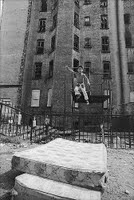 "Gritty" is a strange little literary term. Dictionary.com has no idea that it means what I'm using it to mean, although urbandictionary gets a lot closer. Presumably, it once referred to an actual texture, and the first association would be with gravel and corn-meal. However, I think, when we got obsessed with tone and atmosphere in our books and movies, we adapted it to refer to those places where texture tends to adhere: surfaces, rust, dirt, and cities. It subverts the artificial gloss of modern life, reminding us that as soon as we look away for a second, nature reclaims our stuff.
"Gritty" is a strange little literary term. Dictionary.com has no idea that it means what I'm using it to mean, although urbandictionary gets a lot closer. Presumably, it once referred to an actual texture, and the first association would be with gravel and corn-meal. However, I think, when we got obsessed with tone and atmosphere in our books and movies, we adapted it to refer to those places where texture tends to adhere: surfaces, rust, dirt, and cities. It subverts the artificial gloss of modern life, reminding us that as soon as we look away for a second, nature reclaims our stuff.Texture as a fingerprint of nature, reclaiming the human artifact for the Earth: seems like a good start. By gradual inflection and implication, "gritty" has become an adjective meaning "naturalistic," but implying urban, as far removed from the pastoral as possible. Gritty movies are about difficult lives, lived in the throes of poverty, crime, and questionable morals. This is the product of a certain setting (generally urban), and a certain scale: close and intimate and uncomfortable, entangling the characters and the viewer in tension and hardship. It's an abstract, pervasive stylistic thing that probably ultimately qualifies as a "tone" or an "atmosphere," but that actually dictates the approach to content enough that it could be called a "style" or an "aesthetic."
I suspect Gritty Hollywood got its start in American genre film, especially film noir and (to a lesser degree) Western. However, it's propagated from there into a number of other cinematic spaces: drug movies, gangster and mob films, neo-noir, and even sports films. You can call a lot of films "gritty," if you just look at it as meaning "takes place in a degenerate world, or a city with a lot of dirty stuff"... and by taking this as a starting point, you can fake "gritty" pretty well. However, Benefit of the Doubt would like to adopt a more ambitious definition. To us, "gritty" means an intense narrative with an edge of realism, so the intrigue and drama are offset by a genuine real-world unpredictability. This is how the world looks through eyes of cynicism and uncertainty: our attempts to make things spiritual, meaningful, and sensible are frustrated uphill scrambles as the inevitable landslide of frustration drags us down.
I'm not sure I've seen a movie that epitomizes this quality as strongly as Scorcese's Taxi Driver.
Travis Bickle is a tortured, unhinged third-shift driver in a crusty, cynical 70's New York City. According to his own testimony, he is a Vietnam veteran, and the trauma of the war seems stamped upon his personality: he overreacts and undersleeps, reveling in his own obsessions and unable to control his paranoia. Bickle's moral alignment can't really be articulated... he certainly isn't an outright evil character ("evil" is generally shorthand for opportunistic and sadistic), but his sense of right and wrong is skewed and reactionary, only coming into relief at moments of stress and anger. He projects his frustration into unlikely targets, and channels it into unhealthy obsessions with women. He is completely out of control of the listing and jarring narrative of his everyday life.
 Bickle also loves guns, and has an uncritical fascination with images of sexuality. As such, 70's New York City is almost a perfect place for him... he's surrounded by crime and violence and spectacle, and cheap sexual displays are readily available to him. Many... perhaps all... great cities have been showcases of grime and cynicism, since the aesthetic became such an art: 70's New York, 80's Los Angeles, 40's Chicago, and occasionally Boston -- these are the gritty cities where American filmmakers have discovered their criminal undergrounds. Kurosawa found it in Tokyo (Stray Dog) and Danny Boyle found it in Edinburgh (Trainspotting). With The Wire, it was Baltimore.
Bickle also loves guns, and has an uncritical fascination with images of sexuality. As such, 70's New York City is almost a perfect place for him... he's surrounded by crime and violence and spectacle, and cheap sexual displays are readily available to him. Many... perhaps all... great cities have been showcases of grime and cynicism, since the aesthetic became such an art: 70's New York, 80's Los Angeles, 40's Chicago, and occasionally Boston -- these are the gritty cities where American filmmakers have discovered their criminal undergrounds. Kurosawa found it in Tokyo (Stray Dog) and Danny Boyle found it in Edinburgh (Trainspotting). With The Wire, it was Baltimore.As for me, here's where I'll be looking. In theaters, I'm watching for Shutter Island, The Wolfman, The Shinjuku Incident, and the Red Riding trilogy. I'm also considering seeing Edge of Darkness and From Paris With Love, although those two aren't such high priorities.
At home, I think I'll watch some of the following, though I'm sure not all: The Salton Sea, King of New York, Gone Baby Gone, Pickpocket, Bicycle Thieves, and Ghost Dog: Way of the Samurai. I know not all of these may qualify as "gritty," but I'll make the call when I see them... and I'll be sure to write about them here.
Hope February has gotten off to a badass start for you all.

No comments:
Post a Comment